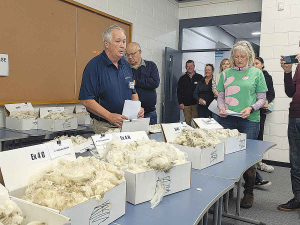Top wool advocate bales out
The conversion of productive farmland into trees has pretty much annihilated the wool industry.
 NZ Woolclassers Association board member Kevin Waldron talks through the finer points of grading wool.
NZ Woolclassers Association board member Kevin Waldron talks through the finer points of grading wool.
A deterioration in the quality of New Zealand's wool clip is a problem for manufacturers and exporters, says Associate Agriculture Minister Mark Patterson.
Speaking at the recent NZ Wool Classers Association professional development day at Lincoln, Patterson said the wool industry has the chance for one of the great turnarounds in New Zealand agricultural commodities, but quality assurance was critical.
"When I'm going around the manufacturers, what I'm hearing quite a bit is the deterioration of the clip is impacting their processes."
He had also heard the same complaint from the Chinese delegation at an international wool conference in Adelaide last year.
"I'm not pointing my finger at the people in this room. What's happened here is that farmers have stopped breeding for wool. They've stopped putting the resource into the sheds and trying to just cut costs to stay viable.
"So, as we start to see the wool price turn - and it has turned and it will go much higher, I'm hoping or absolutely believe that it can - that attention and focus on detail and quality in the sheds is going to be a key part of that turnaround."
Patterson said that Canterbury Spinners in Oamaru (a supplier of woollen yarns to major carpet manufacturers) recently told him of the impact on their efficiency when they must frequently stop and repair the machines.
"That's really disruptive, compared to their synthetic lines that they can run 24 hours a day, seven days a week, without stopping because they're just totally consistent.
"So that's the competition. We have been disrupted badly by synthetics. We're fighting back but part of that fightback is doing our job as farmers, as shearing contractors, wool classers and that sort of thing."
Patterson said he had been "one of those really cynical farmers that didn't really see too much of a future for the wool industry" and it seemed to be in a downward spiral.
However, there was now a big swing back to natural fibres and he was now very confident of a big turnaround.
More than 100 registered for the event, which included practical workshops, speakers, and the association's AGM. Attendees included classers, students, growers, shearers and others in the wool trade.
Patterson told them that their end of the supply chain was "absolutely critical".
Patterson said the message needs to go out from the attendees to the farmers to focus on quality.
"I think we'll see quite quickly that there will be quite a premium start to emerge between the better prepared wools and the not so well."
The message was actually about the viability of hill country sheep and beef farming, and to turn that around we need to turn around their profitability, particularly through getting a better return for wool, he said.
"We don't want to see New Zealand turn into a massive pine plantation."
Introduced to the event as "the Minister of Wool," Patterson was applauded for the Government's recent announcement that government agencies must now use wool fibres and products in construction and fitout of new and refurbished buildings.
We cannot expound the virtues of wool if we're not prepared to use it ourselves, he said.
However, it was not just selling more carpet or more insulation that would turn the industry around, but innovation in uses such as medicinal, sanitary, filtration and acoustics.
Patterson said acoustics manufacturer Autex - a major sponsor of the NZ Warriors - have launched a woollen product after four years development.
Amazing Quality
NZ Wool Classers Association chair Tracy Paterson said the amazing qualities of wool have been known "through eons".
"But it's about making sure that we maintain the quality and from the wool classers' side of things that's important to what we do.
"So, these industry days for us are really important about education and then also bringing everybody up at the same time, and giving people industry oversight, the whole lot."
Patterson said the industry days, usually one each in the North and South Islands, covered different aspects each year.
"When you come to an industry day, you're going to have new things at you, you're going to learn something."
Patterson said the drop in sheep numbers across New Zealand was "a bit of a shame" but the likes of New Zealand Merino and PGG Wrightson were doing their damnedest to build new markets.
South Island dairy production is up on last year despite an unusually wet, dull and stormy summer, says DairyNZ lower South Island regional manager Jared Stockman.
Following a side-by-side rolling into a gully, Safer Farms has issued a new Safety Alert.
Coming in at a year-end total at 3088 units, a rise of around 10% over the 2806 total for 2024, the signs are that the New Zealand farm machinery industry is turning the corner after a difficult couple of years.
New Zealand's animal health industry has a new tool addressing a long-standing sustainability issue.
The Government has announced that ACC will be a sponsor of this year's FMG Young Farmer of the Year competition.
As veterinary student numbers grow to help address New Zealand's national workforce shortge, Massey University's School of Veterinary Science is inviting more veterinary practices to partner in training the next generation of vets.